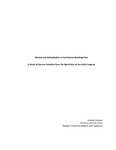Division and Radicalization in the German Working Class: A Study of German Socialism from the Revolution to the Halle Congress (thesis)

View/
Author
Paulsen, Timothy E.
Subject
Washington and Lee University -- Honors in History
Socialism
Working class
Germany
Twentieth century
Revolution (Germany : 1918-1919)
Metadata
Show full item recordDescription
Thesis; [FULL-TEXT FREELY AVAILABLE ONLINE] Timothy E. Paulsen is a member of the Class of 2015 of Washington and Lee University. While class differences and ideological disagreements did play a role in the permanent division of the German working class, the actions of the Ebert government, especially the violence committed by the Freikorps under Noske, were the most important factors therein. Ebert and Noske consistently relied upon the army command, which at best felt ambivalence towards the Republic and the SPD, and upon the Freikorps, who through their brutality irreparably damaged the relationship between the left and right wings of German socialism. Although the USPD did not act blamelessly, and despite the intransigence of the communists on the far left, the SPD responded with disproportionate force to the threat posed by the radical left. Altogether, this violence, as well as a strict adherence to the principle of immediate transition to parliamentary government, undermined opportunities for military and economic reform through SPD cooperation with the USPD, which drove these two parties apart. Further, the SPD thereby contributed to the radicalization of a large segment of the USPD membership, who became the mass base of the KPD following the USPD Halle Party Congress of 1920. [From Introduction] Timothy Paulsen